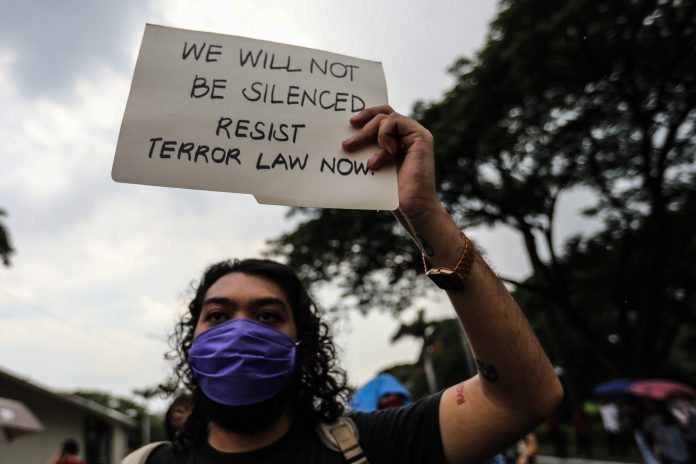The question of the disciples of John the Baptist in today’s (Saturday) Gospel is a bit amusing, “How come, we and the Pharisees do fasting on many occasions, but your disciples do not?” If I were in the position of Jesus, I would probably have said, “Well, I don’t know about you; why don’t you ask yourselves what you are doing it for?” My way of saying, “Shouldn’t you be answering that question yourselves?”
That’s the typical problem with rituals, you know. They often turn into traditions that are passed on from generation to generation. The original setting in which they were practiced may have been clear to those who introduced them. But in time, they can lose their meaning or relevance, if they are simply passed on mindlessly and their historical context is forgotten.
One good example of a practice that is put into question and eventually discontinued is the significance of this date, July 4. Did you know that we used to celebrate this date as our Independence Day, as if we were also Americans celebrating 1776? The Americans did indeed claim to have granted us independence on the fourth of July 1946, and we celebrated it as our Independence Day, until, on August 4, 1964, upon the advice of historians and the urging of nationalists, President Diosdado Macapagal signed into law the Republic Act No. 4166 restoring June 12 as our country’s original Independence Day. It was an effort to correct history and assert the fact that we were already an independent nation when the Americans annexed us into their territory as a new colony on the strength of the Treaty of Paris that ended the Spanish American war.
In our first reading, I can see the hand of a later editor who is introducing into the original oracles of the 8th century prophet Amos, his own later reading of history in the 6th century, after the Babylonian exile. He is predicting a better future for the nation, a time of restoration, a time of freedom and prosperity, that would last, only if they never again forget the lessons of the history.
What is Jesus teaching us about history in our Gospel today? He is saying it figuratively: “You don’t patch an old coat with a new piece of cloth. You don’t put new wine in old wineskins.” That is, if you don’t want to end up spoiling both. In Tagalog sometimes we say, “Oo tama, pero wala sa lugar.” Meaning, you can be right but, given another context, you can be wrong because you’re out of place, or out of time. We also say in Tagalog, “May tamang lugar at panahon ang lahat ng bagay.” (There is a proper time and place for all things.)
This should remind you of that famous passage in the Book of Ecclesiastes 3, “There is an appointed time for everything, and a time for every affair under the heavens. A time to be born, and a time to die; a time to plant, and a time to uproot what is planted. A time to kill, and a time to heal; time to tear down, and a time to build. A time to weep, and a time to laugh; a time to mourn, and a time to dance. A time to scatter stones, and a time to gather them; time to embrace, and a time to be far from embraces. A time to seek, and a time to lose; a time to keep, and a time to cast away. A time to rend, and a time to sew; a time to be silent, and a time to speak. A time to love, and a time to hate; a time of war, and a time of peace.”
Perhaps we would have a better sense of history if we know the difference between TIME and TIMING. This difference is very clear in Greek in the distinction between time as CHRONOS and time as KAIROS, between time as specific dates and periods associated with certain events, and time as the significance of these events.
Like the things that are presently happening in the world, in our country, or in the Philippine society. Whether it be about the newly signed Anti-Terror Act, or the recent killings committed again by the police, or the cases against journalists and media institutions, or criminal charges against specific personalities, or the 14 missing fishermen whose boat had collided with a Chinese cargo vessel in Mamburao, or the POGOS as BPOs. Jesus teaches us to ask questions like, “What is the context?” What is the significance of these events within their given time and setting? What are these things telling us about ourselves as a nation?
There was a much-quoted saying by the Jewish Rabbi Hillel that says, “If I am not for myself, who will be for me? And being for myself, what am ‘I’? And if not now, when?” This saying was paraphrased by the student activist Ditto Sarmiento in the 70’s and immortalized in the movie Sister Estela L. “If we do not do anything, who will? If we do not care, who will care? If not now, when?” Honestly, it sounds better in Tagalog, “Kung hindi tayo kikilos, sino ang kikilos? Kung hindi tayo kikibo, sino ang kikibo? Kung hindi ngayon, kailan?”
Homily for July 4, 2020, Saturday of the 13th Week in Ordinary Time, Matthew 9:14-17, by Bishop Pablo Virgilio David of Kalookan.









